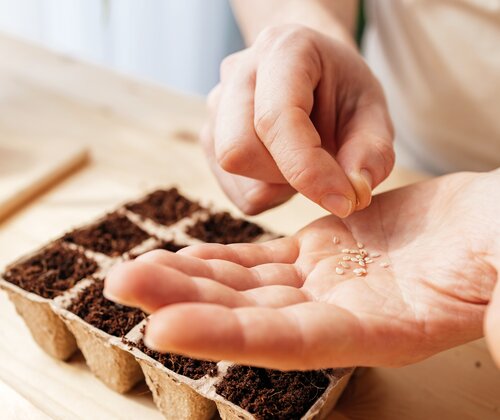

What are Effective Microorganisms?
Effective microorganisms briefly explained
Effective Microorganisms (EM) are liquid mixed microbial cultures consisting of bacteria and yeasts, and the term “Effective Microorganisms” is now used by many manufacturers for a wide variety of products without testing their exact mode of action. At Multikraft, quality is our top priority. This is why our Effective Microorganisms are the result of extensive research carried out in our own laboratory and by external research partners, as well as strict quality testing and assurance. Our products are tested and adapted to a wide range of applications.
Effective Microorganisms (EM) are liquid mixed microbial cultures consisting of bacteria and yeasts, and the term “Effective Microorganisms” is now used by many manufacturers for a wide variety of products without testing their exact mode of action. At Multikraft, quality is our top priority. This is why our Effective Microorganisms are the result of extensive research carried out in our own laboratory and by external research partners, as well as strict quality testing and assurance. Our products are tested and adapted to a wide range of applications.
How do Effective Microorganisms work
Effective microorganisms (EM) promote beneficial microbes and suppress undesirable ones. In this way, they support the ecological balance and counteract the spread of harmful microorganisms. They contribute to the health of the environment by allowing beneficial microbes to dominate and reducing putrefaction processes.
[Microorganisms]: Microscopically small, primarily unicellular organisms that colonize all surfaces and habitats.
Effective microorganisms (EM) promote beneficial microbes and suppress undesirable ones. In this way, they support the ecological balance and counteract the spread of harmful microorganisms. They contribute to the health of the environment by allowing beneficial microbes to dominate and reducing putrefaction processes.
[Microorganisms]: Microscopically small, primarily unicellular organisms that colonize all surfaces and habitats.
The advantages of Effective Microorganisms

Improved microbial environment
Effective microorganisms contribute to the development and maintenance of a healthy microbiome.

Protection against harmful germs
They help to suppress pathogenic germs and promote a healthy environment for people and nature.

Decomposition of organic substances
Effective microorganisms accelerate the decomposition of biowaste and thus prevent putrefaction processes.
EM areas of application at a glance
Garden and plants
Effective Microorganisms (EM) in the garden create a healthy environment in the soil and on the surface of leaves. The plants grow stronger and germination, flowering, fruiting, ripening and yield quality are all improved.
The benefits of Effective Microorganisms in the garden and for plant care:
- Colourful flowers, leaves and fruit
- Vegetables and fruit that are full of flavour and have a longer storage life
- Naturally strong, robust plants that are less prone to attacks from pests and diseases


Ponds
Used as a pond treatment, Effective Microorganisms promote an ecological balance and encourage plant growth, which reduces the formation of algae.
The benefits of Effective Microorganisms in pond care:
- Clear water as a result of a reduction in sediment and rotting
- Reducing algal growth
- Promoting the growth of useful aquatic plants
Household
Effective Microorganisms can be used for a variety of purposes throughout the home, not only in the garden and for plant care. Their basic property of supporting positive bacteria and suppressing rotting processes has specific benefits, particularly with regard to cleaning, the indoor climate and the disposal of kitchen waste.
The benefits of Effective Microorganisms in the home include:
- Turning kitchen waste into useful fertiliser
- The probiotic cleaning effect reduces the recurrence of dirt
- Particularly glossy leaves on houseplants

The mode of action of Effective Microorganisms in detail
Fermentation - the basis of our products
Fermentation is a biotechnological process that describes the degradation and conversion of organic substances with the help of bacteria, fungi or cell cultures.
People have been using fermentation processes for thousands of years, primarily to preserve and refine food: Bread, dairy products such as cheese or yoghurt, but also the production of alcohol or sauerkraut would not be possible without fermentation using bacterial or fungal cultures.
Fermentation processes form the basis of our product development. This natural method involves processing various raw materials such as sugar cane molasses, herbs and plant extracts. This process leads to the formation of enzymes, vitamins and antioxidants in our Multikraft products. These valuable ingredients stimulate regenerative processes and thus support the health of plants, animals and humans. They also contribute to a positive environmental impact.
Fermentation is a biotechnological process that describes the degradation and conversion of organic substances with the help of bacteria, fungi or cell cultures.
People have been using fermentation processes for thousands of years, primarily to preserve and refine food: Bread, dairy products such as cheese or yoghurt, but also the production of alcohol or sauerkraut would not be possible without fermentation using bacterial or fungal cultures.
Fermentation processes form the basis of our product development. This natural method involves processing various raw materials such as sugar cane molasses, herbs and plant extracts. This process leads to the formation of enzymes, vitamins and antioxidants in our Multikraft products. These valuable ingredients stimulate regenerative processes and thus support the health of plants, animals and humans. They also contribute to a positive environmental impact.
The antioxidant principle
In contrast to oxidation, which can lead to an increase in free radicals that are harmful to the respective environment, antioxidation prevents the combination of substances with oxygen by donating electrons and even reverses this process.
Effective microorganisms produce antioxidants in large quantities. These consist primarily of polysaccharides, chelated minerals with catalytic activity, and small amounts of vitamins C and E as well as trace elements.
Effective Microorganisms can be summarised under the regenerative type. They can directly and indirectly prevent decay in all substances and thus keep living things and the environment healthy.
The degenerative type of microorganism behaves in exactly the opposite way to the regenerative type.
The neutral microorganisms form the largest group and follow the so-called dominance principle of the group that is predominant in a system.
So if we create an environment in which regenerative microorganisms predominate, the neutral microorganisms follow the build-up process and degradative or putrefactive processes are prevented. The use of Effective Microorganisms therefore opens up completely new dimensions in many areas of life.
The composition of Effective Microorganisms
Effective Microorganisms are mixed cultures of microbes consisting primarily of lactic acid bacteria, yeasts and photosynthesis bacteria. Many of the microorganisms in these cultures are used to produce and extend the shelf life of foods and are beneficial for plants, people, animals and the environment.
Lactic acid bacteria
Under anaerobic conditions, lactic acid bacteria promote the rapid decomposition of organic material and produce lactic acid in fermentation processes. This has a preserving effect. It creates an environment where pathogens cannot develop and also forms enzymes and other valuable substances such as antioxidants and vitamins. These have a positive effect on the health of plants, animals and people.
Under anaerobic conditions, lactic acid bacteria promote the rapid decomposition of organic material and produce lactic acid in fermentation processes. This has a preserving effect. It creates an environment where pathogens cannot develop and also forms enzymes and other valuable substances such as antioxidants and vitamins. These have a positive effect on the health of plants, animals and people.
Photosynthesis bacteria
Photosynthesis bacteria are among the earliest organisms to colonise the Earth. They come from an era in the Earth’s history when conditions were hostile to life. At the time, the atmosphere contained ammonia, hydrogen sulphide and other harmful compounds. In order to survive, the bacteria developed the ability to neutralise toxins with the help of enzymes and to break down the metabolites from rotting processes and convert them into regenerative substances.
The interaction of all the cultures in Effective Microorganisms allows degenerative processes such as rotting to be transformed into positive, constructive and life-enhancing processes.
Photosynthesis bacteria are among the earliest organisms to colonise the Earth. They come from an era in the Earth’s history when conditions were hostile to life. At the time, the atmosphere contained ammonia, hydrogen sulphide and other harmful compounds. In order to survive, the bacteria developed the ability to neutralise toxins with the help of enzymes and to break down the metabolites from rotting processes and convert them into regenerative substances.
The interaction of all the cultures in Effective Microorganisms allows degenerative processes such as rotting to be transformed into positive, constructive and life-enhancing processes.
Yeasts
Yeasts are single-celled fungi that are able to perform two different types of metabolic processes: fermentation and respiration. In the presence of oxygen, carbon compounds are broken down and carbon dioxide is produced, whereas in anaerobic conditions, carbohydrates are fermented to form alcohol. Yeasts have been used by people for millennia to make bread and alcohol. In Effective Microorganisms, they maintain the balance of the mixed culture of microbes and form an important supply of energy for other microorganisms.
Yeasts are single-celled fungi that are able to perform two different types of metabolic processes: fermentation and respiration. In the presence of oxygen, carbon compounds are broken down and carbon dioxide is produced, whereas in anaerobic conditions, carbohydrates are fermented to form alcohol. Yeasts have been used by people for millennia to make bread and alcohol. In Effective Microorganisms, they maintain the balance of the mixed culture of microbes and form an important supply of energy for other microorganisms.

Blog
News from the home, garden & pond area

Wooden floors are very popular because of their unique look. The sustainable material radiates warmth and naturalness, feels good and grounding and is generally extremely durable. Find out how to take good care of your floorboards and make them shine with the eMC cleaners from Multikraft from our expert Barbara Enengel in our new series "Multiwissen - Barbara's effective tips for every home"

February marks the start of young plant cultivation for chillies and peppers, followed by tomatoes in March and, a little later in April, courgettes, cucumbers and pumpkins. A successful start is crucial for the healthy growth of plants. These tips will increase your germination success.
Do you still have questions?
Are you interested in one of Multikraft's products, but are still unsure and would like to find out more?
Our experts will be happy to help you!
